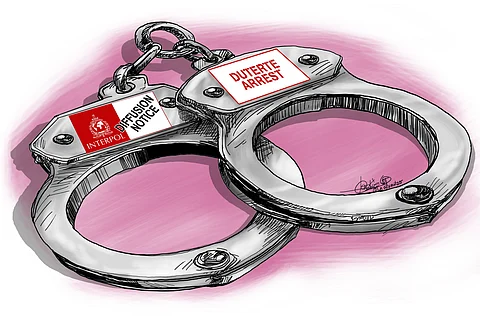
- NEWS
- the EDIT
- COMMENTARY
- BUSINESS
- LIFE
- SHOW
- ACTION
- GLOBAL GOALS
- SNAPS
- DYARYO TIRADA
- MORE

The stretching of rules and procedures made possible the arrest and rapid transfer of former President Rodrigo Duterte to The Hague on 11 March to face crimes against humanity charges before the International Criminal Court (ICC), based on the revelations of the enablers in a recent Senate foreign relations committee inquiry.
The modern-day forced exile of Duterte marked a shift in the definition of a country’s sovereignty.
The procedure’s execution — that relied on an Interpol notice, invoked Republic Act 11479 or the Anti-Terrorism Act, and bypassed judicial oversight — involved the stretching of legal norms that undermined due process, skirted constitutional protections, and favored political expediency hiding behind global accountability.
Duterte was arrested under an Interpol (International Crime Police Organization) diffusion notice rather than the more formal Red Notice, law enforcement officials conceded during the hearing.
A diffusion notice, by Interpol’s definition, is a flexible, informal alert, often a request for information or provisional action, that lacks the authoritative weight of a Red Notice’s call for arrest pending extradition.
The diffusion notice was manipulated into a mandate for Duterte’s immediate detention and transfer to The Hague. Enforcing the Interpol notification was a flimsy cover for what amounted to a legal shortcut.
The Philippines, an Interpol member since 1947, may cooperate with such notices. Still, nothing in Interpol’s framework demands the lightning-fast, no-questions-asked extradition of a former head of state within hours.
The government leaned heavily on Interpol to justify taking Duterte into custody given the Philippines’ 2019 withdrawal from the ICC.
By inflating the notice’s significance, the need for a formal extradition process, which would have required judicial review and public transparency, was sidestepped.
The informal alert was weaponized to bypass a sovereign legal system, a precedent that could haunt the Philippines if its citizens face similar treatment abroad.
An egregious stretch was the invocation of Republic Act 11479 or the Anti-Terrorism Act of 2020 to legitimize Duterte’s arrest and transfer.
Designed to combat terrorism, the law permits provisional arrests based on foreign requests under specific conditions, such as imminent threats or terrorist affiliations.
The former president’s case bears no semblance to terrorism as defined by RA 11479, which targets acts intended to cause death, injury, or public panic for political ends.
Stretching the statute to cover an ICC warrant for crimes against humanity is a legal contortion that defies the law’s text and intent.
Repurposing a domestic anti-terror tool to facilitate an international judicial process the country could otherwise resist as a non-ICC member reeked of bad faith.
The misapplication was also a deliberate sidestep of judicial checks. RA 11479 allows arrests without immediate warrants in terrorism cases, but it still presumes eventual court oversight.
Duterte’s transfer within hours, before the Supreme Court could rule on habeas corpus and TRO petitions filed by his family and allies, rendered court oversight ineffective.
The use of the anti-terror law effectively laundered the diffusion notice into a domestic mandate, bypassing the constitutional due process required in Article III, Section 1, which guarantees a right to contest detention.
By cloaking the arrest under RA 11479’s authority, the government evaded the need for an extradition hearing or a domestic judicial imprimatur, a maneuver that mocked the spirit of Article 59 of the Rome Statute.
Despite the country’s ICC withdrawal nullifying Article 59’s binding force, its principle — that arrests respect custodial state procedures — highlighted the irregularity of the action against Duterte.
The haste — arrest at 10 a.m., departure by 11:03 p.m. — underscored how the process was engineered to outpace a judicial intervention, rendering moot constitutional protections.
Everything said and revealed in the Senate inquiry pointed to an operation to silence a political heavyweight under the guise of enforcing international justice.
